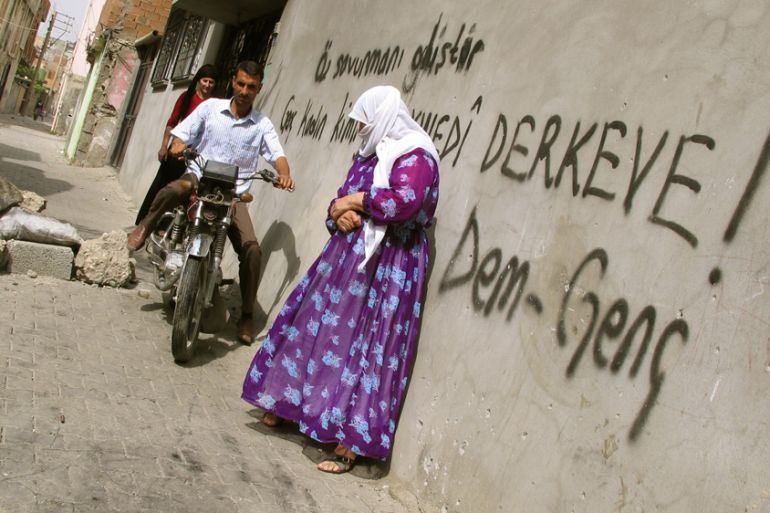Kurdish city battered by Turkey’s crackdown
In Cizre, residents hope life will return to normal after more than a week of curfew and heavy fighting.

Cizre, Turkey – “The curfew will be enforced again within 30 minutes,” loudspeakers blasted over the battered streets of Cizre last week.
The announcement came as a shock to residents of this restive Kurdish-majority city. During an eight-day curfew that was lifted the previous Friday, 32 Kurdish fighters were killed, according to government officials – though Kurdish sources pegged the death toll at 21 civilians. The Turkey-based human rights group IHD, meanwhile, told Al Jazeera that 22 people died in the clashes.
After the second curfew was reinstated for 12 hours last Sunday, clashes could be heard late into the night between Turkish security forces and the Patriotic Revolutionary Youth Movement (YDG-H), a Kurdish armed group that is allegedly close to the outlawed Kurdistan Workers Party (PKK).
RELATED: Turkey lifts curfew in Cizre after clashes with the PKK
In July, a ceasefire between the Turkish government and the PKK collapsed after a bombing in the town of Suruc killed 32 people, mostly Kurdish activists. Since then, hundreds have died in the fighting.
Cizre saw heavy damage during both curfews. “My house was destroyed during the third day of the curfew. It was almost new, built just a year ago but look at it now,” said 68-year-old Hathiye Yokarcik, who lives in Cizre’s Noor district, one of three areas controlled by the YDG-H.
“I don’t dare to go in because I fear the police might have left a bomb inside,” Yokarcik told Al Jazeera, pointing to the facade of her house that had not yet been painted, but was riddled with dozens of bullet holes.
|
|
Rumours that Turkish police have planted booby traps have dissuaded many in Cizre from recovering their belongings after their homes were shelled. Speculation has swirled around a video that purports to show a Turkish police officer carrying an object that looks like a gas canister with a wire hanging from it, while he is escorted by another member of Turkish security forces. The video has not been authenticated.
Ali Ihsan Su, the governor of Sirnak province, where Cizre is located, has rejected such allegations, calling them “unfounded”. Su said the video in question showed Turkish security forces defusing explosives that were “left behind by the terrorist separatist organisation”.
Further down the street from Yokarcik’s house, across ditches and barricades made of sandbags and debris, Abdurrahman Danesh’s house does not look any better. The 70-year-old pensioner showed the high-calibre projectile that destroyed the iron gate and part of the wall surrounding his courtyard. He said it was just one of many types of explosive devices that hit his house, which was close to a YDG-H position.
In Cizre’s Cudi district, which also suffered heavy damage in recent days, the PKK’s red and yellow banners hung above residents’ heads on the streets, while posters and graffiti lauding Abdullah Ocalan, the imprisoned cofounder and leader of the PKK, were ubiquitous.
Unlike many others in the area, Ibrahim Dostam and his family returned to their flat to check if anything could be rescued from the debris. His plasma TV was hit by a projectile that pierced the flat. Although three members of the Dostam family were in the room at that moment, no one was badly injured.
Although the gaping holes in many of Cudi’s houses remain the most obvious sign of the destruction, the stink emanating from the district’s grocery stores serve as a reminder that there has been no electricity for more than a week. Cizre residents have mostly been eating pasta and rice, with meat no longer an option.
They will try to ruin our lives here until we decide to leave the city. That's the main plan.
“There were snipers all over, so no one could leave the house during the curfew,” 34-year-old pharmacist Vafi Aksoy told Al Jazeera.
RELATED: Cizre back on the front-lines of Turkey-PKK conflict
Shopkeeper Abdulla Dogan said he lost around 10,000 Turkish lira ($3,300) during the eight days that he was unable to open his flower shop in downtown Cizre. “They will try to ruin our lives here until we decide to leave the city. That’s the main plan,” Dogan told Al Jazeera.
A five-minute walk from his house is the Mala Gel – the “People’s House” in Kurdish – which is run by the local Kurdish administration. Nursel Aydogan, the Kurdish MP for Diyarbakir, recently met there with Leyla Imret, Cizre’s 28-year-old mayor, who was dismissed from her post earlier this month on charges of “promoting terror and inciting hatred”.
Aydogan told Al Jazeera that there were also districts under a curfew in her native city of Diyarbakir, which according to her, was “just two among the many locations all across Turkey’s east which have decided to defend themselves against the government’s aggression”.
In the same building, Heval Zilan, a 22-year-old woman affiliated with the YDG-H in Cudi, told Al Jazeera that the group’s fighters – she could not say how many there were – relied mainly on the support of the community and were armed with Molotov cocktails, hunting rifles, and a few AK-47 assault rifles.
Meanwhile, as Cizre’s residents say they hope life will return to normal soon, they anxiously await new announcements from the city’s loudspeakers.